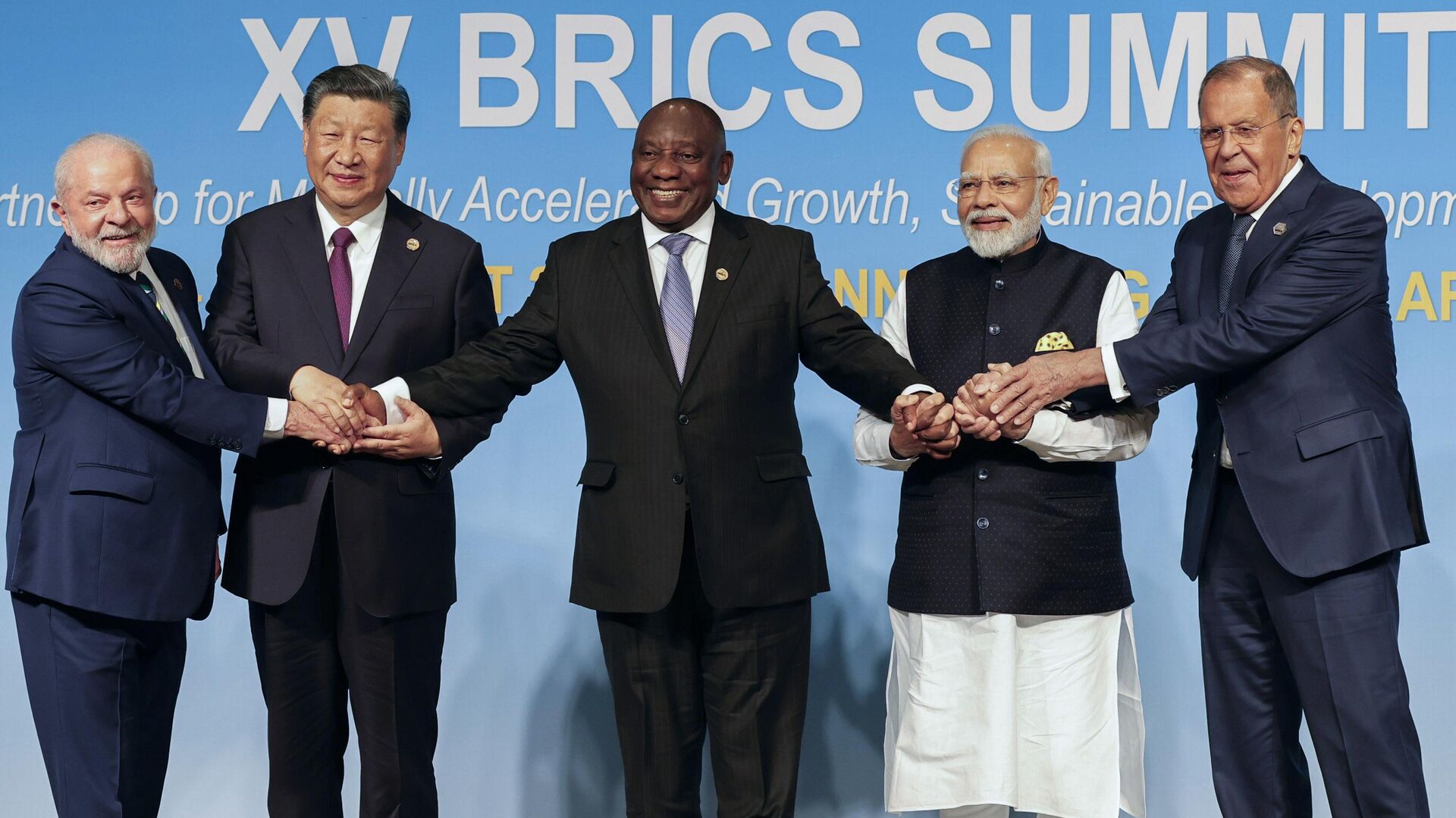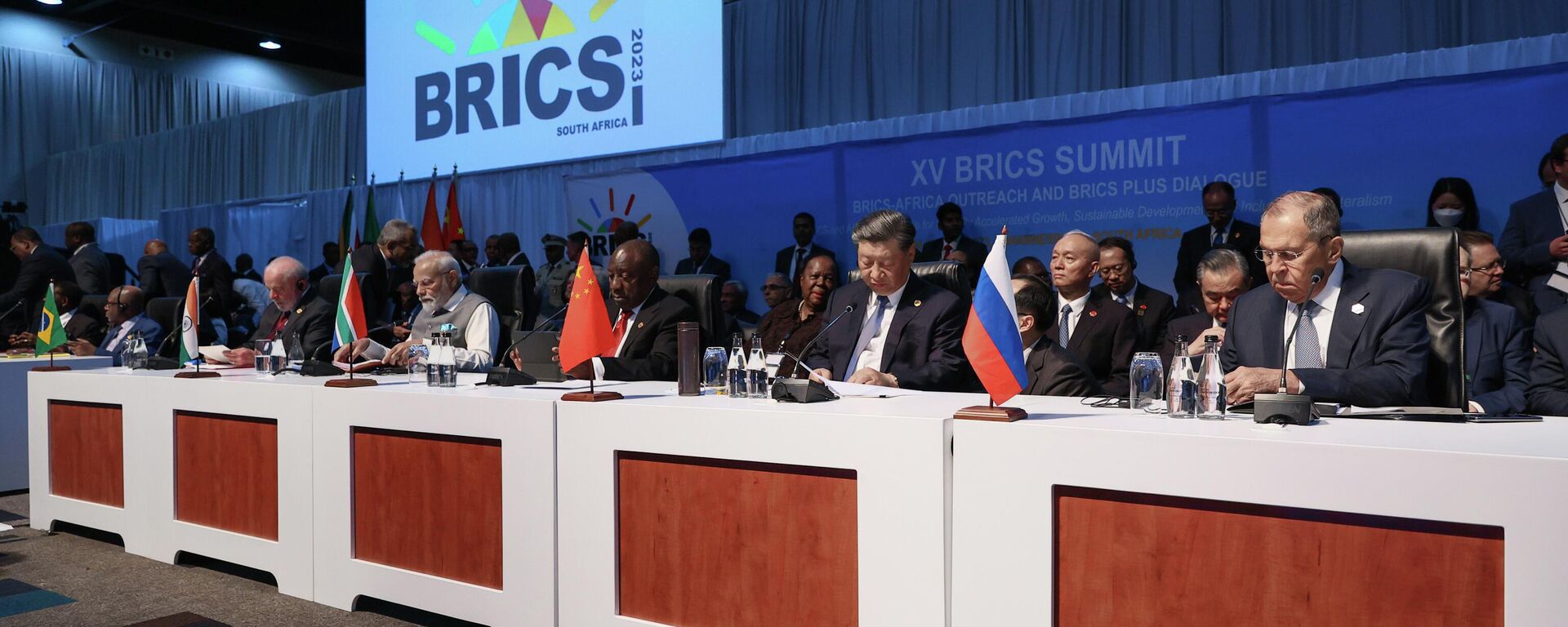https://en.sputniknews.africa/20231226/about-30-countries-want-to-partner-with-brics-lavrov-reveals-1064316761.html
About 30 Countries Want to Partner With BRICS, Lavrov Reveals
About 30 Countries Want to Partner With BRICS, Lavrov Reveals
Sputnik Africa
Founded in 2009, BRICS is a group of the world's largest emerging economies, currently comprising Brazil, Russia, India, China and South Africa, representing... 26.12.2023, Sputnik Africa
2023-12-26T14:04+0100
2023-12-26T14:04+0100
2023-12-26T14:04+0100
brics
sergey lavrov
international
russia
brics expansion
brazil
south africa
southern africa
india
china
https://cdn1.img.sputniknews.africa/img/07e7/0a/0c/1062736017_0:135:2742:1677_1920x0_80_0_0_ea7b1dacd86b6b670b97b8ba3c226785.jpg
About three dozen countries are eager to get closer to BRICS and establish partnership relations with the bloc, Russian Foreign Minister Sergey Lavrov said at the meeting of the general council of the United Russia party on international cooperation and support for compatriots abroad.For example, Latin American countries are very interested in joining BRICS following the inclusion of new members to the bloc, Lavrov revealed.He added that the kind of consensus reached with countries that sometimes have different approaches is very valuable. Lavrov noted that such a consensus is "stronger, more durable, more reliable than the decisions that in some Western unions are made by decree of a hegemon."The minister also noted that Russia will continue to work on strengthening BRICS as one of the pillars of the multipolar world.In this regard, Lavrov touched on Russia's BRICS chairmanship in 2024, saying that Moscow expects a "solid set of decisions" to be taken at the highest level at the bloc's summit in Kazan in October 2024.According to him, dozens of Russian cities will host more than two hundred events on political, economic and social issues during Russia's BRICS presidency.He added that the leaders of developing countries will take part in these formats.In August, the BRICS summit in Johannesburg opened the door for Ethiopia, Argentina, Egypt, Iran, Saudi Arabia and the United Arab Emirates to join the bloc. Full membership for these countries is scheduled to take effect on January 1, 2024.In total, more than 20 countries have formally applied to join BRICS, as South African Foreign Minister Naledi Pandor announced in early August.
https://en.sputniknews.africa/20231215/off-axis-relations-experts-explain-benefits-of-closer-brics-africa-ties-1064129597.html
russia
brazil
south africa
southern africa
india
china
Sputnik Africa
feedback@sputniknews.com
+74956456601
MIA „Rossiya Segodnya“
2023
Sputnik Africa
feedback@sputniknews.com
+74956456601
MIA „Rossiya Segodnya“
News
en_EN
Sputnik Africa
feedback@sputniknews.com
+74956456601
MIA „Rossiya Segodnya“
Sputnik Africa
feedback@sputniknews.com
+74956456601
MIA „Rossiya Segodnya“
brics, sergey lavrov, international, russia, brics expansion, brazil, south africa, southern africa, india, china, cooperation
brics, sergey lavrov, international, russia, brics expansion, brazil, south africa, southern africa, india, china, cooperation
About 30 Countries Want to Partner With BRICS, Lavrov Reveals
Founded in 2009, BRICS is a group of the world's largest emerging economies, currently comprising Brazil, Russia, India, China and South Africa, representing nearly one-third of the world's GDP and about 40% of the world's population.
About three dozen countries are eager to get
closer to BRICS and establish partnership relations with the bloc, Russian Foreign Minister Sergey Lavrov said at the meeting of the general council of the United Russia party on international cooperation and support for compatriots abroad.
"It is natural that, given the fact that BRICS operates on truly democratic and mutually respectful principles, many countries are eager to get closer to it. In addition to the countries that have already joined the ranks of our association, today about three dozen countries want to establish relations, partner relations with BRICS," the top diplomat noted.
For example, Latin American countries are very interested in
joining BRICS following the inclusion of new members to the bloc, Lavrov revealed.
"With the inclusion of new members in BRICS, including Saudi Arabia, Egypt, the UAE, Iran, Ethiopia — and Argentina has now taken time out to think about it — there is certainly strong interest in Latin America in the alliance, but with new members, work will become more multifaceted and it will take more time to reach agreements," he emphasized.
He added that the
kind of consensus reached with countries that sometimes have different approaches is very valuable. Lavrov noted that such a consensus is "stronger, more durable, more reliable than the decisions that in some Western unions are made by decree of a hegemon."
The minister also noted that Russia will continue to work on strengthening BRICS as one of the pillars of the multipolar world.
In this regard, Lavrov touched on
Russia's BRICS chairmanship in 2024, saying that Moscow expects a "solid set of decisions" to be taken at the highest level at the bloc's summit in Kazan in October 2024.
According to him, dozens of Russian cities will host more than two hundred events on political, economic and social issues during Russia's BRICS presidency.
"The BRICS summit in Kazan next October will be the high point. Together with our partners, we expect to make a solid set of decisions at the highest level in the main areas of cooperation. Of course, on the margins of the BRICS summit and in preparation for it, there will be contacts with our partners, including the summit format, including BRICS+," Lavrov pointed out.
He added that the leaders of developing countries will take part in these formats.
In August, the BRICS summit in Johannesburg opened the door for Ethiopia, Argentina, Egypt, Iran, Saudi Arabia and the United Arab Emirates to join the bloc. Full membership for these countries is scheduled to take effect on January 1, 2024.
In total, more than 20 countries have formally applied to
join BRICS, as South African Foreign Minister Naledi Pandor announced in early August.


